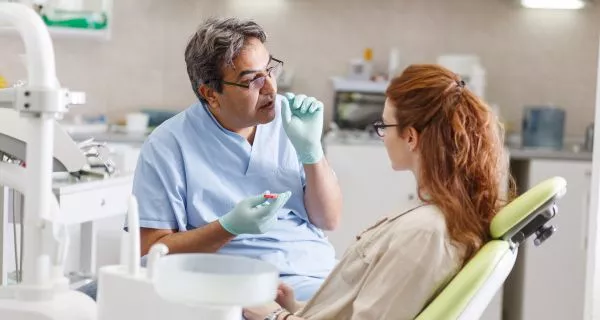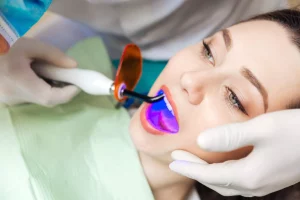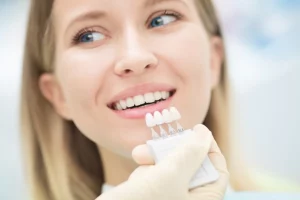Last Updated on: 13th February 2026, 08:43 am
Swollen cheeks can result from dental infections, facial injuries, salivary gland problems, allergies, or systemic conditions. Because some causes can be serious, Ventura County patients should seek a prompt evaluation. A local dentist in Ventura, Oxnard, Newbury Park, Port Hueneme, or Santa Paula can identify the source and guide appropriate treatment.

The cheeks comprise the skin, muscle and fat located on the sides of the face. They ensure that food does not come out of the mouth during chewing. Swelling of the cheeks is easily noticeable since it produces a visual change in facial aesthetics. In addition the patient will perceive a sensation of increased volume in the area.
It’s natural for cheek swelling to be a cause of concern. This alteration can be caused by a wide variety of reasons and for each of them, a different treatment is indicated.
Information about swelling of the cheeks and what to do will be discussed below. It will be especially useful if you live in Ventura County in the above areas.
Table of Contents
ToggleCommon causes of swollen cheeks

There are many possible causes of puffy cheeks. The specific origin of this condition must be determined to treat it successfully. Here are the most frequent causes of swollen cheeks:
Dental abscess
A dental abscess is one of the most frequent reasons to consult with a dentist; in fact, it may be an emergency.
- It can happen when an infection originating in the nerve of the tooth or the surrounding tissues progresses until it produces an accumulation of pus in the cheek area.
- It usually appears as fluctuating and soft on only one side of the face.
- It can also be caused by tooth decay or gum disease.
- Impacted or infected wisdom teeth often create pain, stiffness, and swelling in the cheeks.
This condition needs quick treatment because the infection can spread. If you live in Ventura County and notice swelling on one side of your face, you can reach out to a local dentist in Ventura, Oxnard, Newbury Park, Port Hueneme, or Santa Paula for urgent care.
Facial cellulite
This condition is produced by an infection under the skin and other facial tissues.
- It may originate in the teeth or the supporting tissues, but it can also be generated by pimples or skin wounds that allow bacteria to enter.
- It presents as severe swelling accompanied by redness, heat, and intense pain.
- It usually manifests as a hard consistency and is located on only one side of the face.
- In advanced cases, it could cause closure of the eye or obstruction of the respiratory tract and if not treated in time, it could be fatal.
If you live in Ventura County, a local dentist at Channel Islands Family Dental office can identify whether facial cellulitis comes from a dental infection and guide you to urgent medical attention to prevent possible complications.
Facial injury

After suffering a blow or trauma to the face, it is normal for swelling and redness to appear in the cheek area. Of note, bruising may appear days after the event.
If the swelling continues for more than a day or two and you are in Ventura, Oxnard, Newbury Park, Port Hueneme, or Santa Paula, a local dentist can take X rays and check for hidden tooth damage.
Salivary gland infection
In the cheeks are the parotids – the largest salivary glands. Under normal conditions they are imperceptible, but they could become inflamed due to an infection. Two types of infection may occur:
- Bacteriana (sialadenitis): This occurs when the channels that carry saliva to the mouth are blocked by a calculus (small stone) or when the glands produce insufficient saliva.
- Viral (parotitis or mumps): As a contagious disease caused by a virus, it affects the entire body, but one of the most noticeable manifestations is an inflammation of the parotid glands.
It is more common during childhood and can be prevented with the MMR vaccine. It also causes headaches, loss of appetite, and fever among other symptoms. It requires care to avoid complications.
If you are in Ventura County and feel swelling near the lower jaw, a dentist nearby will evaluate your salivary glands and recommend treatment.
Angioedema
It presents as a swelling, which – although it can occur anywhere on the body – most commonly affects the face.
- This condition is generated by an allergic reaction to medications or other substances, known as “allergens”.
- It usually happens in a matter of minutes and is usually painless.
If you feel swelling spreading quickly, get medical help immediately. If the swelling is slow or comes with tooth pain, a dentist in Ventura County can help rule out likely dental causes.
Hypothyroidism

The thyroid is a gland located in the neck, responsible for secreting hormones that regulate the rhythm of various body functions.
- When the gland fails, it can cause multiple symptoms, including facial swelling.
- In such cases, the face swells on both sides, and there is no pain.
Cysts or tumors
Although it is not a frequent condition, masses or cysts may appear in the area of the jaws and inside the mouth. They will be noticed in the increased size of the cheeks.
- It may or may not present pain.
- In many cases, if these are not treated in time, they could cause the total or partial loss of the jaw, and even become fatal.
Don’t wait too long to visit a dentist. If you live in Ventura County and need help, you can visit a dentist in Ventura, Oxnard, Newbury Park, Port Hueneme, or Santa Paula. Local care will help you get faster treatment and prevent the condition from getting worse.
Can puffy cheeks be treated at home?

Because swelling in the cheeks can be caused by many factors and some could be serious, it is always necessary to go to the doctor for tests to determine the origin of the swelling and receive the appropriate treatment.
If there is pain and the sensation of heat in the area of the swelling, the patient can apply cold water cloths while seeking medical or dental attention.
When to seek medical or dental care?
Whenever swelling of the face occurs and is not caused by a blow or facial injury, professional attention should be sought, especially if accompanied by pain, redness, tenderness, or general discomfort.
To determine the cause of this condition, the doctor or dentist will perform a physical examination. It may be accompanied by other studies such as X-rays, computed tomography, resonances, and blood tests, among others.
When should you see a dentist in Ventura County

You should contact a dentist as soon as possible if you experience:
- swelling that worsens over time
- fever or signs of infection
- trouble opening your mouth
- a bad taste or discharge
- pain that interferes with daily activities
When to seek emergency treatment?
If you perceive swollen cheeks, seek emergency medical treatment when:
- The swelling increases rapidly.
- The swelling causes closure of the eye or obstruction of the airway.
- The patient presents general malaise: chills, fever, dehydration, discouragement, and a loss of appetite.
- Difficulty breathing.
Recommendations

If the treating professional determines that the swelling is the product of an infection, he or she could prescribe antibiotics, which must be taken in their entirety – strictly following the indicated schedule – to guarantee effectiveness.
- Although in all cases the swelling of the face can be a delicate situation, in children, the inflammation generated by infections can progress even faster and become even more dangerous.
- It is not appropriate to take antibiotics without a prescription for the following reasons:
- Each infection requires a specific antibiotic for the type of bacteria that has caused it.
- In very advanced stages, antibiotics taken orally may not be effective, and the patient may require intravenous administration.
- The antibiotic must be carefully chosen by the treating professional, taking into account the patients’ other medications or the allergies presented.
- No bacterial infection originating in the teeth is resolved only by taking antibiotics. They constitute a source of support for full treatment, and it will always be necessary to remove the cause of the infection such as:
- performing a root canal
- draining the abscess
- extracting the affection tooth
The success of these treatments is usually greater when carried out on time. Therefore, when presenting swollen cheeks, it is advisable to go to the doctor as soon as possible to treat the condition in its initial phase.
Conclusion
Swelling in the cheeks can be caused by multiple causes – some more serious than others. If a patient presents this symptom, it is advisable to see a dental or medical professional to determine the cause and receive the appropriate treatment.
Some causes may be life-threatening infections or diseases, making it important to be aware of the above warning signs and seek emergency care if necessary.
Seeking timely care from a local Ventura County dentist helps you get the right diagnosis and treatment.
Frequently Asked Questions (FAQ)
Voice Search Snippets (Q&A)
References
1. Agrawal, A., Singh, V., Kumar, P., Bhagol, A., Narwal, A., & Singh, I. (2017). Unilateral swelling of the cheek. National journal of maxillofacial surgery, 8(2), 157–161. https://doi.org/10.4103/0975-5950.221703
2. Cleveland Clinic. (2022, September 29). Mumps. https://my.clevelandclinic.org/health/diseases/15007-mumps
3. Frysh, P. Reasons Why Your Face Looks Swollen. WebMD. https://www.webmd.com/allergies/ss/slideshow-swollen-face
4. Higuera, V. (2019, March 19).What’s Causing My Cheek to Swell and How do I Treat it? Healthline. https://www.healthline.com/health/swollen-cheek
5. Kahn, A. (2024, July 16). What can cause facial swelling or a puffy face? Healthline. https://www.healthline.com/health/facial-swelling














